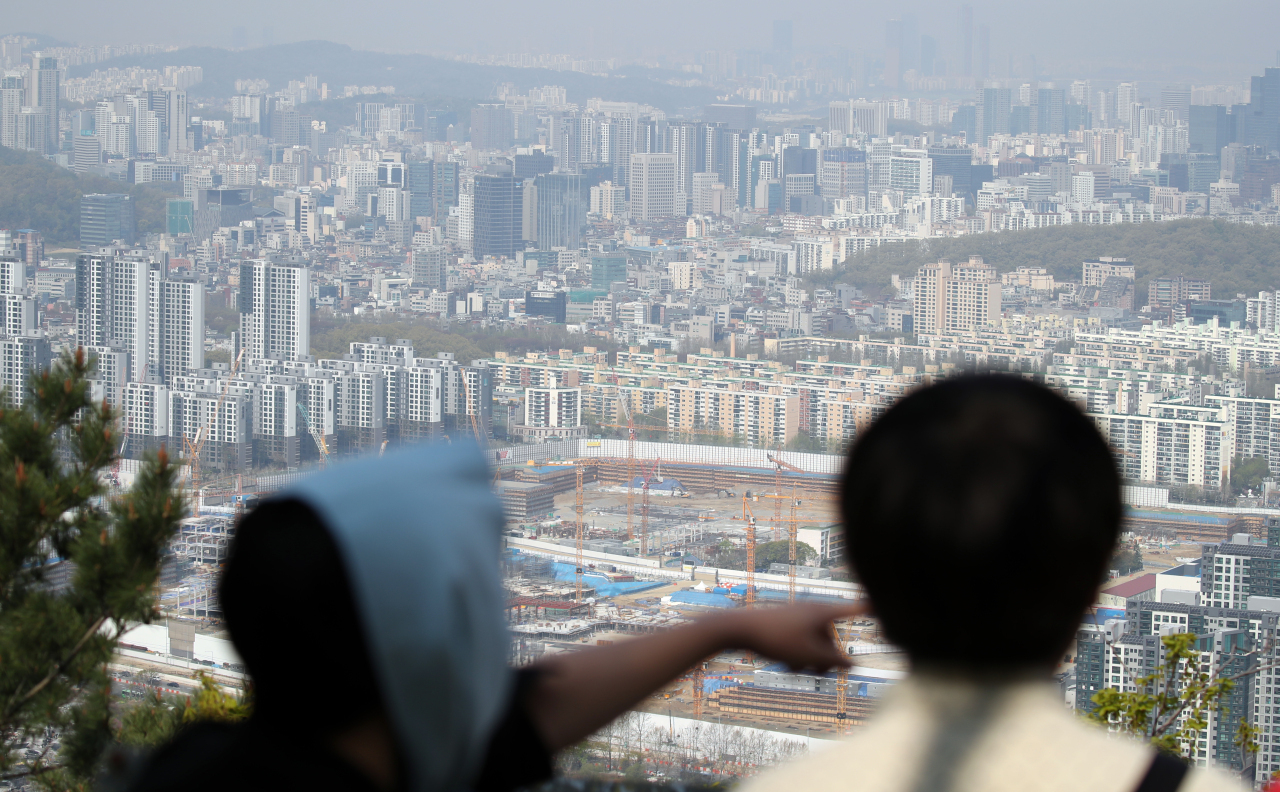Economy
[Feature] Korea’s aging society faces burden of rising debts, heavy taxes
 |
Apartments in Gangnam are seen from Daemosan in Irwon-dong, Seoul, on April 11. (Yonhap) |
Cho Young-eun, a 68-year-old retiree in Seoul, thought she would have a comfortable life in the years ahead. She and her husband had an apartment to live in, and a pension and savings to cover their daily expenses.
But her expectations were shattered when she learned about the tax hike on her home in Gangnam last month. She paid around 4 million won ($3,577) in comprehensive real estate taxes last year but might have to pay nearly 3 million won extra this year and 7.5 million won more next year, she said.
“According to our calculations, we may have to pay 21.33 million won just for the comprehensive real estate tax in 2023,” she said. “It’s much more than our pension. We are concerned about how we are going to pay without certain income.”
Cho is among many South Koreans already feeling the pressure from heavy taxes as the government increases spending to remedy the economic fallout from COVID-19 and to realize a fair distribution of wealth.
A survey released on April 21 showed that more than 7 in 10 Koreans, or 74.6 percent of 1,026 respondents, were struggling with a tax burden that has increased over the past five years.
About 65 percent of respondents believe their taxes are too high considering their current income, according to the survey commissioned by the Korea Economic Research Institute.
When asked which taxes had increased the most, 32 percent of respondents cited acquisition, property and comprehensive real estate taxes. These were the most popular answers, followed by social security, income and corporate taxes.
The poll results came out as government spending on coronavirus relief and the pandemic response has drained government coffers. Concerns over rising government debt have spiraled, with five extra budgets drawn up since last year and universal cash handouts.
In March, the National Assembly approved an extraordinary budget worth nearly 15 trillion won to help prop up small merchants and other vulnerable people hit hard by the yearlong COVID-19 pandemic. Last year’s four extra budgets totaled 66.8 trillion won.
Accordingly, government debt had climbed to 846.9 trillion won as of the end of 2020 from 723.2 trillion won in 2019, according to the Ministry of Economy and Finance.
The fiscal deficit more than doubled the previous record of 54.4 trillion won in 2019.
The ratio of government debt to gross domestic product increased by 6.3 percentage points during the same period, from 37.7 percent to 44 percent. The higher the debt-to-GDP ratio, the higher its risk of default.
Prompting further concern is a projection from the International Monetary Fund, released April 7, that the government debt load is expected to jump to 69.7 percent of GDP by 2026.
Andreas Bauer, Korea mission chief for the IMF, said earlier this month that the country was capable of handling the current debt level but underlined the importance of taking a forward-looking approach when mapping out future spending plans so that the debt burden doesn’t explode, with the country’s elderly population growing at a fast pace.
Challenges lying ahead of Korea include health care costs and other liabilities associated with aging, according to Bauer.
Korea is in a population conundrum with a rapidly graying population, low birthrate and young people who are increasingly shunning marriage. It is expected to become a super-aged society in 2025, which means 1 in 5 Koreans will be aged 65 or older.
Policymakers, including Finance Minister Hong Nam-ki, have acknowledged this issue.
“In the case of Korea, it is impossible to overlook the fact that financial expenditures may increase rapidly due to the slow economic growth rate, ultralow birthrate and the arrival of an ultra-aged society,” the minister said when he announced the extra budget in March.
To guard against mid- to long-term risks, the Finance Ministry said it would bolster efforts to enhance fiscal soundness by drastically restructuring expenditures and strengthening financial penalties for tax evasion.
But experts say it seems inevitable that tax hikes will be an issue even after the uncertainty related to the pandemic fades away.
Park Hyung-soo, a visiting professor at Yonsei University and former Statistics Korea commissioner, said Korea overcame the 1997 Asian financial crisis and the 2008 global financial crisis in a relatively short time because it left room to maneuver and maintained a strong fiscal balance to promote a healthy recovery.
But the country’s fiscal soundness has deteriorated, as the government has expanded welfare spending without overhauling the taxation system.
“Since taking office in 2017, the Moon Jae-in administration has pushed for tax hikes, including raising the maximum corporate tax rate and income taxes focusing on high earners and large conglomerates. But tax revenue has stagnated due to strengthened tax support for the middle- and low-income group,” he said.
The government should first seek ways to lower public expenditures once the country achieves herd immunity through vaccination by putting an end to relief programs, according to Lee Tae-suk, head of the public finance and social department at the Korea Development Institute. “If debt continues to rise despite such an effort, discussions could begin on possible hikes of corporate, income and consumption taxes in order to shoulder the national debt burden,” he said.
By Park Han-na (hnpark@heraldcorp.com)








